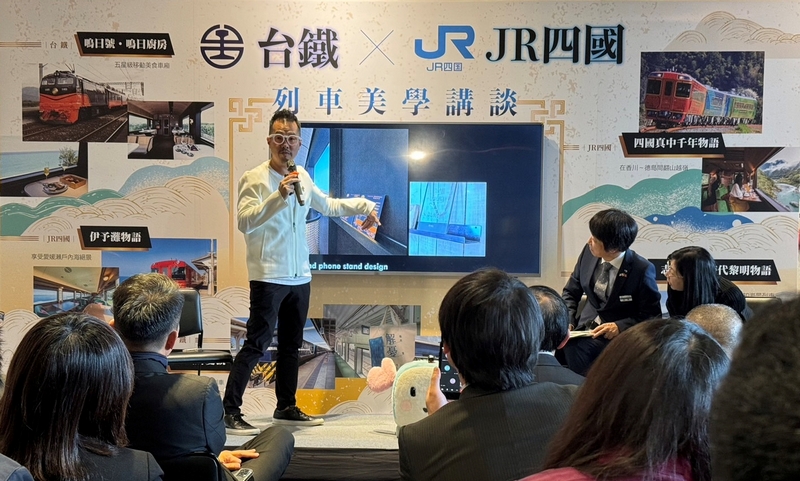On January 17, 2024, a remarkable event unfolded in the Taiwan design landscape: Japan Railway and Taiwan Railway, two major railway entities, came together for a discussion on train design at the entrance plaza of Songshan train station in Taipei. It was a momentous occasion, to my recollection, this marks the first-ever design dialogue between these giants of the railway industry.

(按此瀏覽中文版)
3.7 Million Smiling Faces: The Story of the JR Shikoku Sightseeing Train
Japan Railway is an international stardom that is known for its punctuality, advanced technology, and safety; more importantly, I love its design of the trains, which has won so much global recognition for its tech cutting edge and streamlined design.
At this design exchange between the two entities, I heard many first-hand stories about how JR Shikoku’s series of sightseeing trains were designed. To my surprise, their design story also started with someone without experience designing trains. Tetsuya Matsuoka was just an ordinary JR employee who had an architectural background; one day, he was called into the manager’s office by his superior, asking him if he would like to design the train; as a train fanatic, he was shocked, of course happily agree to such a unique opportunity, and that was the start of the story, so direct, so accidental, and beautiful at the same time.
The outcome of his willingness became a series of sightseeing train designs named “Iyonada Monogatari 伊予灘物語, Shikoku Mannaka Sennen Monogatari 四國真中千年物語, Shikoku Tosa Toki no Yoake Monogatari, 志國土佐 時代黎明物語” each with its unique character, some linking to its cultural background, some links to the scientific discovery of the area. Eventually, he ended the talk with how 3,700,000 smiles welcomed this train; as it passed through villages, the people of Shikoku welcomed the train by stopping what they were doing and waving at the oncoming passengers. The train has become integral to the local community’s life, symbolizing JR’s cherished presence.

Breaking Boundaries: The Rise of Innovative Design in Taiwan’s Transportation
Contrasting Japan’s entrenched design legacy, where does Taiwan stand in this innovative race? What possibilities lie ahead for us?
With the successful design ventures of the Future and the Moving Kitchen, it’s clear that our advantage lies in our freedom from pre-existing design constraints. This fresh perspective allows us to reimagine and redefine the possibilities of transportation design.
This mindset has begun to inspire other sectors. The Maritime Port Bureau’s interest in redesigning ferry services and the New Taipei Metro Company’s collaboration on the Circle Line are testaments to this. Even the iconic Alishan Forest Railway is experiencing a transformative redesign, reflecting a nationwide shift towards a unique transportation identity crafted from local culture, not reliant on foreign designs but built on our unique innovation.
Be Part of the Transportation Design Revolution: What is Your Role?
So, how can you be involved? How can you participate in this revolutionary step where we designers challenge the status quote of what transportation design means?
As a business owner, you can think of an opportunity to extend the branding of such a transportation.
As a travel agent, you can now bring different people on board and take the unique transportation experience, experiencing this island in many different ways.
As a hotel owner, you can link your hotel services with the transportation designs so that the experience doesn’t only end on a moving wheel but ends with a starlit sky under your property.

Redefine Taiwan’s Transportation Design: From Local Innovations to Global Influence
Japan’s rich history of tourism trains, including over 50 “Joyful Trains” and the inception of the first railway dining car in 1899, illustrates a longstanding tradition of rail innovation. However, Taiwan’s fresh slate presents an exciting opportunity to craft our own exciting future in transportation design.
The design of Future 鳴日號 and the Moving Kitchen 鳴日廚房, was our first transportation design, and we focused on designing a “journey” for the passengers, not just a “train design.” This alternative approach breathed life into a groundbreaking train design that captured domestic and global acclaim (CNN report “The Future: Taiwan’s most beautiful train” and won the iF Gold design 2023).
The transportation future for us is endless, and we are only getting started.
What could be our possible transportation future for this small island? Welcome to share your thoughts with me.
For further details, please visit www.johnnyisborn.com.












